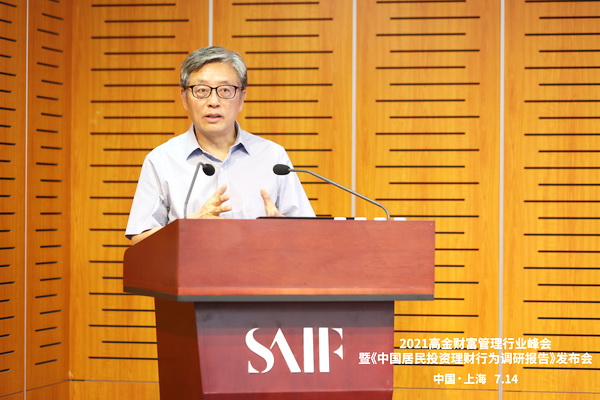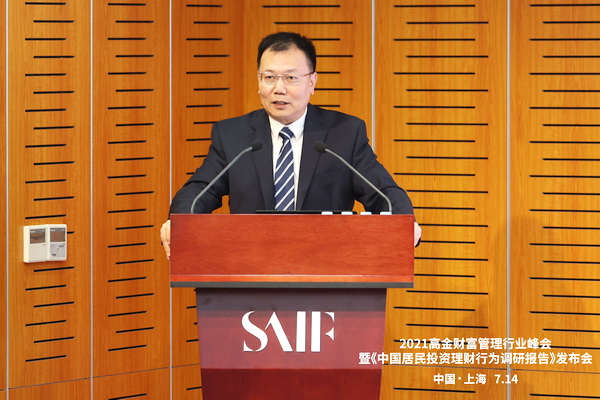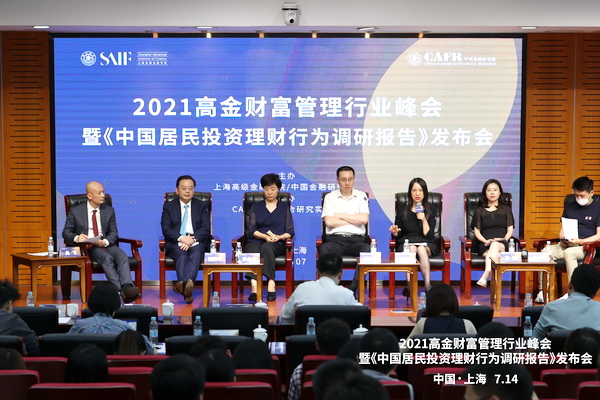On July 14, the 2021 SAIF Wealth Management Industry Summit and the Release of "The Report on China Residents' Investment and Financial Management Behaviors (the Report)" was held at the Shanghai Advanced Institute of Finance (SAIF) at Shanghai Jiao Tong University (SJTU). Professor Guangshao Tu (Adjunct Professor at SJTU and Executive Director of the SAIF Board) delivered a speech. Professor Hong Yan (Deputy Dean for Faculty and Research, Professor of Finance) gave his analysis of the Report.

In his speech, Professor Tu emphasized the importance of residents' investment and financial management. He also pointed out that residents' investment and financial behavior directly influenced social financing structure, allocation of market resources, and capital market development. "Residents' investment and financial management should be valued," said Professor Tu.
Tu summarized and analyzed six trends of the current changes in residents' investment and financial management. These included: the rapid growth of aggregate demand, the continuous differentiation of demand structure, the transition of wealth structure, the transformation of the financial service industry, the empowering role of capital management technology, and the gradually standardized market order.
Tu also gave suggestions on how to respond to the changing demands of residents through various avenues, such as: capital market development, improving the capability of capital management institutions, upgrading the market service system, enhancing investors' education, and promoting the standardization of the financial management market. "Problems and needs guide us to better promote the sound development of wealth management industry and the market," Professor Tu mentioned.
The Report was jointly released by SAIF, the China Academy of Finance Research (CAFR), and the Ant Group Research Institute. Professor Tu stated that the study combines SAIF's top academic research team with the Ant Research Institute's data resources; the two sides complemented each other. Moreover, he highly recommended the Report as an investment and financial management guideline to residents.

Professor Hong Yan started the Report release session with an introduction to its background and methodology, combined with the main findings in the Report and some reflection about the research process.
Professor Yan Hong said that since the Reform and Opening Up, Chinese residents have continued to accumulate wealth, generating increasing demands for wealth management. With guidance from the government, industry associations, and academia, financial awareness among Chinese residents has risen. In the current context of the rigid repayment break, interest rate decline, and real estate regulation, the wealth management demands of residents have been further released and transformed. This brings opportunities and challenges for the development of China's wealth management industry. To understand the current situation, in March 2021, CAFR and Ant Group Research Institute conducted an online questionnaire survey on active Alipay users in different age groups and regions to analyze the main characteristics of Chinese residents' investment and financial management behavior. With the results and findings of the survey, the Report was completed.
Professor Yan then introduced the main conclusion in the Report. According to the evaluation of residents' financial health, most of the Chinese residents have set up family reserve funds or have purchased insurance, which demonstrates their risk management awareness. Evaluation dimensions were risk management awareness, asset allocation diversification, financial goals and planning, and family debt management.
Residents' financial investment preferences are relatively conservative and mainly focus on bank deposits. Overall, their financial planning awareness needs to be improved and they have not formed a disciplined financial planning habit. Although the general indebtedness is manageable, some households have problems with debt management.

The Report also analyzes the current financial management behaviors of Chinese residents in terms of their investment return expectations, insurance allocation, investment period, blind follow-up, automatic investment plans, and the deployment of professional investment advisors. The research finds that residents' expectation of returns is relatively high, especially among the highly educated group. However, their financial returns are often lower than expected. Most residents believe that they are lacking in ability to select products, especially those having only a small amount of financial assets. At the same time, residents prefer life insurance products; people with different income sources and in different age groups also have significant differences in buying insurance.
The report also shows that the long-term value investment habits of Chinese residents have not yet been developed, while people with confidence in their investment ability, high education, and high income are more willing to hold funds for the long term. The "buying winners and selling losers" phenomenon is common in residents' investment and financial management, while the proportion of investors who have the habit of automatic investment and choose to seek professional investment advisory services still needs improvement. Subsequently, participants discussed "How can financial institutions serve the investment and financial demands of residents" and expressed some opinions in the Report.







